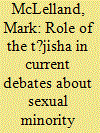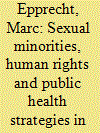|
|
|
Sort Order |
|
|
|
Items / Page
|
|
|
|
|
|
|
| Srl | Item |
| 1 |
ID:
160567


|
|
|
|
|
| Summary/Abstract |
Why do insurgents target certain groups for extermination? Despite a great deal of attention to the targeting of civilian ethnic minorities, comparatively little scholarship exists on insurgent violence against sexual minorities (lesbian, gay, bisexual, or transsexual individuals). This article maintains that the decision to target sexual minorities follows three distinct logics: two strategic and one ideological. First, insurgents face an incentive to outbid rivals by targeting sexual minorities when homophobic violence is politically and socially legitimated. Second, territorial control creates an incentive for insurgents to signal their ability to selectively punish, which they can accomplish through homophobic violence. Third, revolutionary ideologies provide legitimation for exclusionary violence in the pursuit of transforming society. Statistical analysis of insurgent violence against sexual minorities from 1985 to 2015 lends strong support for these arguments. Process tracing of the spread of violence against sexual minorities in Iraq and Syria clarifies the strategic causal mechanisms. When progovernment militias targeted perceived homosexuals with impunity, antigay violence was adopted by insurgent groups seeking to legitimize their claims to power; violence then quickly spread to competing insurgents. Two additional cases from Latin America demonstrate that ideology plays an important role in influencing which groups embrace homophobic violence even under these strategic constraints.
|
|
|
|
|
|
|
|
|
|
|
|
|
|
|
|
| 2 |
ID:
190790


|
|
|
|
|
| Summary/Abstract |
Recently, the legal landscape for sexual minorities in the United States has changed dramatically, prompting empirical research on lesbian, gay, and bisexual (LGB) couples and LGB service members. This study examined the relationship characteristics and mental health of LGB service members in couple relationships and compared partnered and single LGB service members. A total of 238 LGB service members completed an anonymous survey, including questions about demographics, identity, military experiences, and mental health symptoms. Results of descriptive and exploratory analyses revealed no significant differences in mental health between partnered and single participants. However, partnered individuals reported higher outness and lower internalized homophobia compared with their single counterparts. Analyses also revealed negative associations between relationship satisfaction and mental health symptoms among partnered participants. Among the first to examine LGB service members’ romantic relationships, the results of this study have important clinical and policy implications and inform next steps in researching this population.
|
|
|
|
|
|
|
|
|
|
|
|
|
|
|
|
| 3 |
ID:
090586


|
|
|
|
|
| Publication |
2009.
|
| Summary/Abstract |
This paper considers two unforeseen outcomes of the primacy of the t?jisha in current LGBTQ discourse. Firstly, through insisting on attending to the voice of each individual, it has proven difficult to establish common links among discriminated communities (or within communities) because of widely diverging perspectives. Also, given the broad variety in many individuals' experience of non-normative sexuality, having to identify and speak as a t?jisha has engendered normalizing effects. The current primacy of the t?jisha reinforces developmental narratives of sexual-identity formation (only the 'out' homosexual is truly authentic) and in so doing inadvertently silences those unable or unwilling to prioritize the sexual in their presentation of self, or whose modes of self-expression fall outside current orthodoxies that provide the boundaries for sexual-minority identification.
|
|
|
|
|
|
|
|
|
|
|
|
|
|
|
|
| 4 |
ID:
112125


|
|
|
|
|
| Publication |
2012.
|
| Summary/Abstract |
Remarkable progress has been made towards the recognition of sexual minority rights in Africa. At the same time, a marked increase in attacks, rhetorical abuse, and restrictive legislation against sexual minorities or 'homosexuality' makes activism for sexual rights a risky endeavour in many African countries. Campaigns for sexual rights and 'coming out' are frequently perceived as a form of Western cultural imperialism, leading to an exportation of Western gay identities and provoking a patriotic defensiveness. Cultures of quiet acceptance of same-sex relationships or secretive bisexuality are meanwhile also problematic given the high rate of HIV prevalence on much of the continent. This article examines specific initiatives that are using subtle, somewhat covert means to negotiate a path between rights activism and secretive bisexuality. It argues that strategies primarily focused on health concerns that simultaneously yet discreetly promote sexual rights are having some success in challenging prevalent homophobic or 'silencing' cultures and discourses.
|
|
|
|
|
|
|
|
|
|
|
|
|
|
|
|
|
|
|
|
|